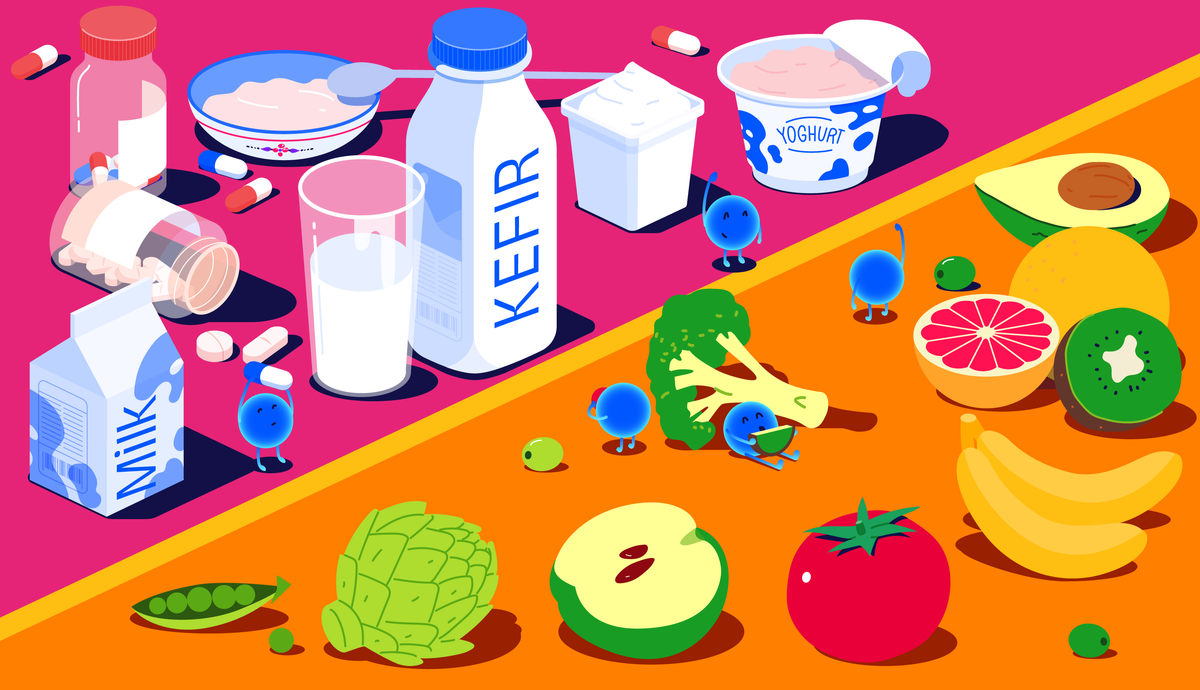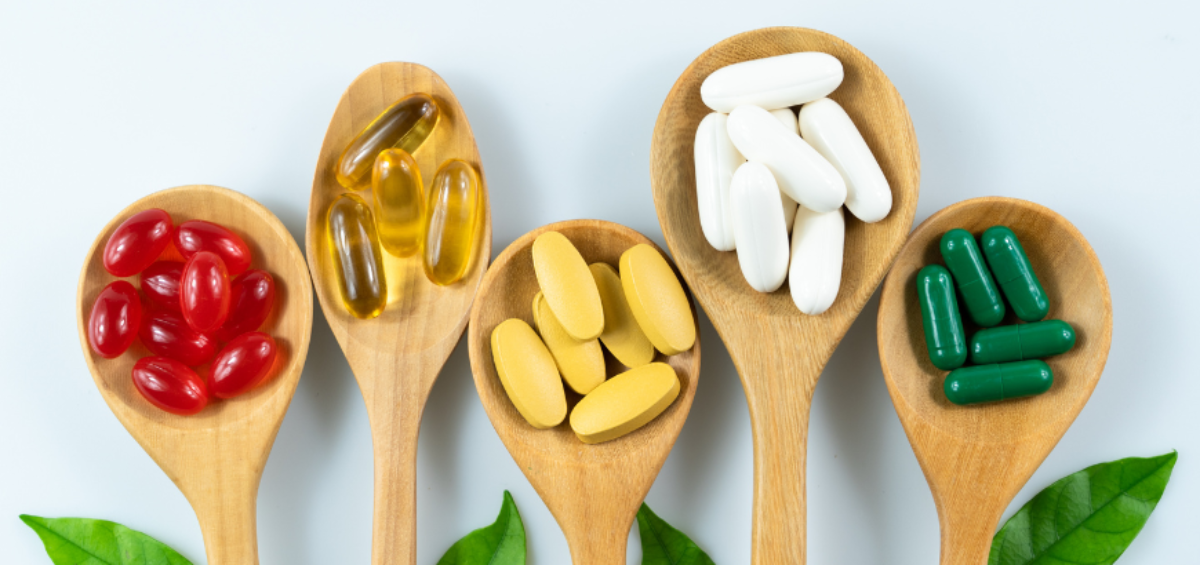Can You Take Prebiotics and Probiotics Together?

In the realm of digestive wellness, two terms have gained considerable attention: prebiotics and probiotics. These two components play distinct yet complementary roles in promoting a healthy gut and overall well-being. As the understanding of gut health deepens, the question arises: Can you take prebiotics and probiotics together for an amplified impact? Join us on this exploration into the world of gut health, as we delve into the intricacies of prebiotics and probiotics, and uncover whether combining them can lead to a harmonious gut-microbiome relationship.
What Are Probiotics?
Probiotics are living microorganisms, often referred to as "good" or "friendly" bacteria, that inhabit your gut. These beneficial bacteria include strains of Lactobacillus, Bifidobacterium, and other species that contribute to a balanced gut microbiome. While the term "bacteria" might sound concerning, it's important to note that probiotics are not harmful pathogens; rather, they are essential for maintaining gut health.
Supporting Digestion and Beyond
The primary role of probiotics is to foster a healthy gut environment, which in turn influences various aspects of your health:
1. Digestive Health:
Probiotics play a crucial role in digestion by aiding in the breakdown of food particles and the absorption of nutrients. They contribute to the fermentation of dietary fibers, producing short-chain fatty acids that nourish the cells lining your colon.
2. Immune System Modulation:
A significant portion of your immune system resides in your gut. Probiotics interact with immune cells, helping to regulate immune responses and maintain a balanced inflammation level.
3. Gut-Brain Connection:
The gut-brain axis highlights the connection between your digestive system and mental health. Probiotics are believed to influence the production of neurotransmitters like serotonin, which play a role in mood regulation.
Sources of Probiotics
Probiotics can be found in various dietary sources, both naturally occurring and as supplements. Some common sources of probiotics include:
- Fermented Foods: Yogurt, kefir, sauerkraut, kimchi, tempeh, and miso are examples of fermented foods rich in probiotics.
- Dairy-Free Options: For individuals who are lactose intolerant or prefer dairy-free options, there are non-dairy yogurts and kefir made from plant-based ingredients.
- Supplements: Probiotic supplements are available in various formulations, each containing specific strains of beneficial bacteria. These supplements can be particularly beneficial when specific health goals or conditions are targeted.
Choosing the Right Probiotics
When selecting probiotic-rich foods or supplements, it's essential to consider the following factors:
- Strain Diversity: Different probiotic strains have varying benefits. Look for products that contain a variety of strains to ensure comprehensive gut support.
- Viable Bacteria: Ensure that the product contains live and viable bacteria. Look for labels that mention the colony-forming units (CFUs) present in each serving.
- Individual Needs: Probiotic needs vary from person to person. Consult a healthcare professional before introducing probiotics, especially if you have underlying health conditions.
The Gut Microbiome Balance
Probiotics are integral in maintaining the balance of your gut microbiome. By introducing these beneficial bacteria, you're promoting an environment where harmful microorganisms are kept in check, supporting optimal digestion, immune function, and overall well-being.
What Are Probiotics?
Prebiotics are specialized types of dietary fibers that serve as fuel for the beneficial bacteria residing in your gut. Unlike probiotics, which are live microorganisms introduced into the body, prebiotics are non-living components found in certain foods. These indigestible fibers pass through the stomach and small intestine undigested, reaching the colon where they become a source of nourishment for your gut's resident microbes.
Nurturing the Beneficial Microbes
Prebiotics act as a form of sustenance for the probiotics – the beneficial bacteria that contribute to various aspects of your health. When you consume prebiotic-rich foods, you're essentially providing a feast for these microbes. This nourishment encourages the growth and activity of the good bacteria, leading to a balanced and diverse gut microbiome.
Types of Prebiotics
There are several types of prebiotics, each with its unique structure and impact. Some of the most well-known types of prebiotics include:
- Inulin: Found in foods like chicory root, Jerusalem artichokes, and bananas, inulin is a prebiotic fiber that promotes the growth of beneficial bacteria.
- Fructooligosaccharides (FOS): Present in foods like garlic, onions, and asparagus, FOS provides a food source for probiotics, contributing to their growth and activity.
- Galactooligosaccharides (GOS): Found in foods like legumes and certain grains, GOS similarly supports the growth of beneficial bacteria in the gut.
Health Benefits of Prebiotics
The impact of prebiotics extends beyond their role in nourishing gut bacteria. Here are some potential benefits associated with consuming prebiotic-rich foods:
1. Enhanced Gut Microbiome Diversity:
By promoting the growth of various beneficial bacteria, prebiotics contribute to a more diverse gut microbiome. A diverse microbiome is linked to improved digestive health and overall well-being.
2. Improved Digestion:
Prebiotics can help regulate bowel movements and prevent constipation by supporting the growth of bacteria that contribute to healthy digestion.
3. Immune System Support:
A balanced gut microbiome influenced by prebiotics can positively impact the immune system. A stronger immune response and reduced inflammation are potential outcomes of a healthy gut environment.
4. Nutrient Absorption:
The presence of beneficial bacteria nurtured by prebiotics can enhance the breakdown and absorption of nutrients, ensuring that your body receives the maximum benefit from the foods you consume.
Incorporating Prebiotics Into Your Diet
To harness the benefits of prebiotics, consider including the following foods in your diet:
- Garlic and onions: These aromatic vegetables are rich in prebiotic fibers that support gut health.
- Asparagus: A versatile vegetable that contains inulin, a potent prebiotic.
- Bananas: Ripe bananas contain resistant starch, a type of prebiotic fiber.
- Whole grains: Foods like oats, barley, and whole wheat are excellent sources of prebiotic fibers.
- Legumes: Lentils, chickpeas, and beans are rich in prebiotics and provide a plant-based source of protein.

The Synergy of Prebiotics and Probiotics
Can You Take Prebiotics and Probiotics Together?
The short answer is yes – taking prebiotics and probiotics together can be beneficial for your gut health. In fact, the synergy between these two components creates a dynamic relationship that enhances the impact of each. While probiotics introduce beneficial bacteria into your gut, prebiotics provide the necessary nourishment for these bacteria to flourish.
Fostering Gut Microbiome Harmony
When you combine prebiotics and probiotics, you're essentially creating an environment in which the beneficial bacteria have both a home and sustenance. The prebiotics act as a food source for the probiotics, allowing them to multiply and establish themselves in the gut. This harmony contributes to the overall balance and diversity of the gut microbiome.
Amplifying Health Benefits
The combination of prebiotics and probiotics can amplify the health benefits associated with each. Probiotics aid in maintaining a balanced gut microbiome, supporting digestion, immune function, and more. Prebiotics, by providing nourishment to probiotics, enhance their ability to carry out their beneficial functions, ultimately promoting better gut health and overall well-being.
The Prebiotic-Probiotic Duo: Practical Applications
Incorporating Both Into Your Diet
To harness the potential of the prebiotic-probiotic duo, consider incorporating both into your diet. This can be achieved by consuming foods that are naturally rich in both prebiotics and probiotics. For example, enjoying a bowl of yogurt (a probiotic source) with sliced bananas (a prebiotic source) creates a synergistic effect that supports gut health.
Supplemental Support
In some cases, individuals may choose to supplement their diet with prebiotic and probiotic supplements. When opting for supplements, it's advisable to consult a healthcare professional or registered dietitian to ensure that the products are suitable for your individual needs.
The Key Takeaway
A Harmonious Partnership for Gut Health
In the realm of digestive wellness, the partnership between prebiotics and probiotics stands as a harmonious and mutually beneficial relationship. While probiotics introduce beneficial bacteria into the gut, prebiotics provide the nourishment needed for these bacteria to thrive. When combined, they amplify each other's positive impact, contributing to a balanced and diverse gut microbiome.
Whether you choose to enjoy them through dietary sources or supplements, the prebiotic-probiotic duo has the potential to enhance your gut health and overall well-being. By fostering a vibrant gut microbiome, you're not only supporting digestion but also contributing to various aspects of your health, from immunity to mental clarity. As you embark on your journey toward better gut health, consider harnessing the power of prebiotics and probiotics, a dynamic duo that your gut will thank you for.
Want more food tips? Check out "What Is MyPlate?"